KANSAS CITY — Slow fermentation.
It is prominent among qualities distinguishing artisan bread from the mainstream packaged sliced bread that has lined supermarket fresh bread aisles for nearly a century. Slow fermentation also is an apt metaphor for the pace at which the artisan bread trend has gained traction among wholesale bakers across the United States.
While efforts by leading U.S. baking companies to break into the artisan bread market date back more than 20 years, new product introductions in 2018 by bakers large and small suggest a heightened determination. Approaches toward the artisan market varied widely among baking companies featured in the 2019 Bread Product Perspective.
Additionally, with the packaged bread category continuing to contract in size, bakers have only intensified efforts to develop a wide range of innovative products to retain existing consumers and lure back those who have lapsed.
Fresh bread sales totaled $9,083,220,302 in the 52 weeks ended Feb. 24, down 0.3% from a year earlier, according to Information Resources, Inc., a Chicago-based market research firm. The data cover sales from grocery, drug, mass market, convenience, military and certain club and dollar retailers. Unit sales were 3,631,601,455, down 4.7%.
While dollar sales were down slightly during the year, each of the four largest U.S. baking companies eked out at least modest gains — Bimbo Bakeries USA, Horsham, Pa., up 0.1%; Flowers Foods, Inc., Thomasville, Ga., up 4.3%; Pepperidge Farm, Inc., Norwalk, Conn., a subsidiary of Campbell Soup Co., up 0.3%; and Lewis Bakeries, Inc., Evansville, Ind., up 3.6%. The private label market for bread was pummeled over the past year, with dollar sales down 7% and unit sales down 11%. Also indicative of the premiumization of the bread category, the average unit price for bread was $2.50, up 4.6%.
Flowers Foods has stepped up innovation activity across much of its portfolio, including the introduction of two varieties under the Nature’s Own brand — Nature’s Own Perfectly Crafted Thin Sliced Multigrain and Nature’s Own Perfectly Crafted.
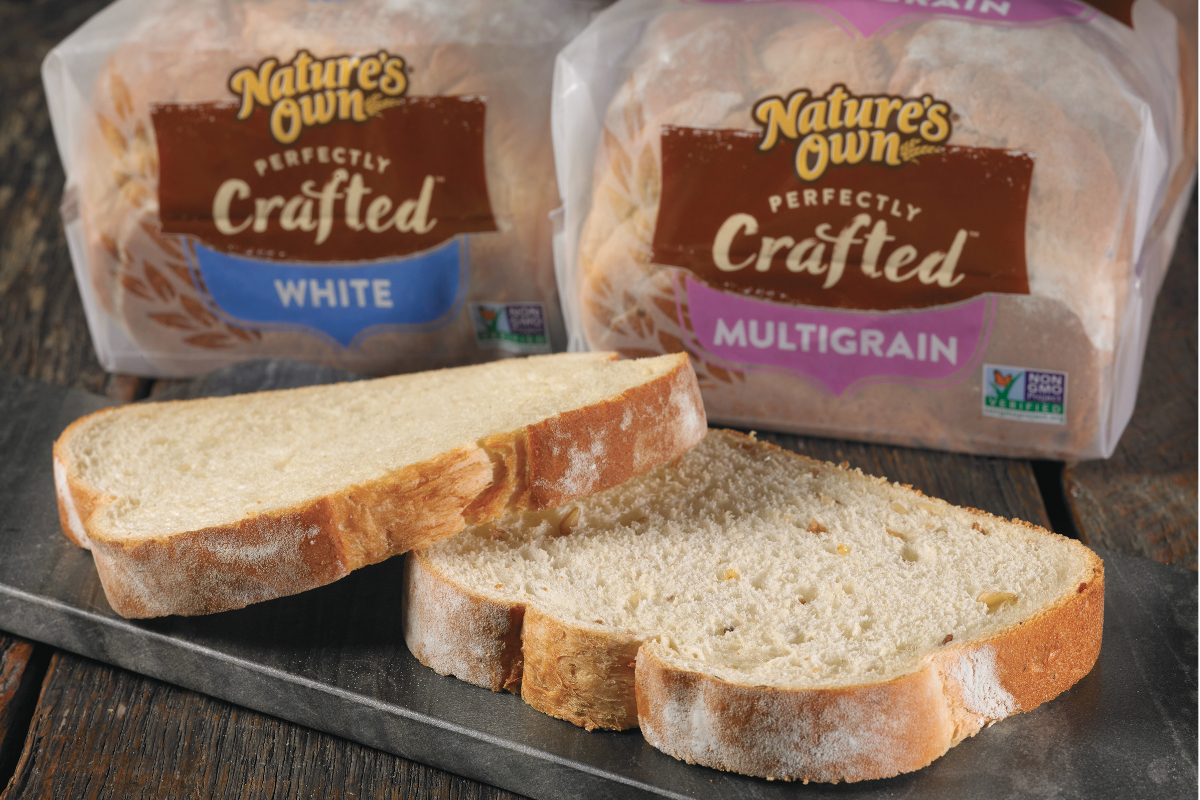
Nature’s Own nod to artisan
Brent Bradshaw, senior vice-president, fresh packaged bread business unit, described the Nature’s Own Perfectly Crafted line as “artisan inspired.”
“Consumers are looking for artisan experience, and our belief was that there was an opportunity to offer it in the bread aisle,” he said. “Consumers told us this concept fit well under the Nature’s Own brand. We developed the product line to have thicker slices and a recipe to give it a ‘heartier’ texture.”
In addition to the longstanding Nature’s Own credentials of no artificial preservatives, colors or flavors, the Nature’s Own Perfectly Crafted line is Non-GMO Project verified.
“Consumer research, including in-home use testing, told us that consumers loved the recipe and positioning,” he said. “They loved how diverse the usage occasions were for the breads. We have been very pleased with the results thus far, both from a sales as well as a trial and repeat standpoint. With strong distribution across most retailers and strong consumer interest, we believe this new line under Nature’s Own has staying power.”
Several new seasonal items were launched under Flowers’ Dave’s Killer Bread, a brand Flowers acquired in 2015. To the D.K.B. bagel line Flowers introduced Boomin’ Berry.
“We have seen great success with our bagel line and wanted to offer our fans a new flavor akin to a berry/blueberry bagel … but done the D.K.B. way,” said Daniel P. Letchinger, senior vice-president, fresh packaged bread business unit. “They are loaded with whole grains and packed with four super berries: blueberry, blackberry, cranberry and acai.”
In the second half of 2018, Flowers introduced seasonal D.K.B. items — Pumpkin Spice Madness bagel, and Sweet Potato Rock ‘n’ Rolls (dinner rolls).
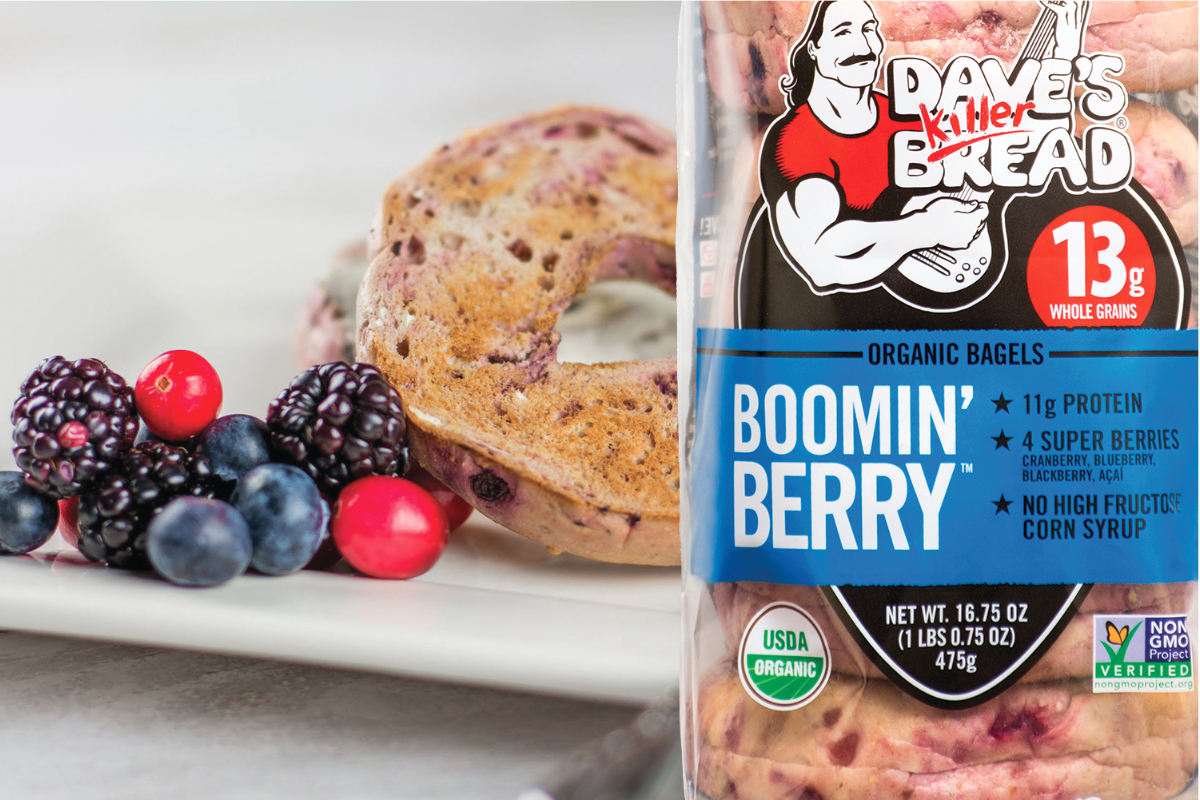
Seasonal Dave’s Killer Bread
Mr. Letchinger said seasonal items were new for D.K.B.
“We wanted to see how D.K.B. could show in this space,” he said. “Our goal was to lean heavily into flavor-forward concepts.”
For example, the Pumpkin Spice Madness featured maple syrup, bits of marshmallow, nutmeg, cinnamon and clove, in addition to pumpkin.
In late November, Flowers introduced English muffins in two varieties — Killer Classic and Rockin’ Grains, which contain 20 grams of whole grains per muffin.
D.K.B. English muffins were developed over a two-year period, Mr. Letchinger said, while the company assured the products tasted good and had the texture consumers expect — crispy outside, soft inside — and settled on the varieties it has introduced.
“We are really focusing our marketing efforts this year on supporting our breakfast products: our bagels, breakfast bread and English muffins,” he said. “Our entire breakfast line is less than two years old, so we have a lot of room to grow with those products.”
The Canyon Bakehouse line of gluten-free baked foods, acquired by Flowers in December 2018, also has seen numerous new product introductions over the past year, Mr. Letchinger said.
A line of “Stay-Fresh” bread, bagels and English muffins were introduced, featuring packaging developed to address shelf-life challenges for retailers and consumers.
“Retailers would like to be able to sell gluten-free bread in any part of the store, not just the freezer,” he said. “Consumers want to be able to keep bread on their counter or in their pantry for a longer time without having to worry about wasting bread. Since grocers sell gluten-free items in different parts of the store — the freezer, in-store bakery, bread aisle — the Stay-Fresh packaging allows us to be in more places, including the fresh bread aisle.”
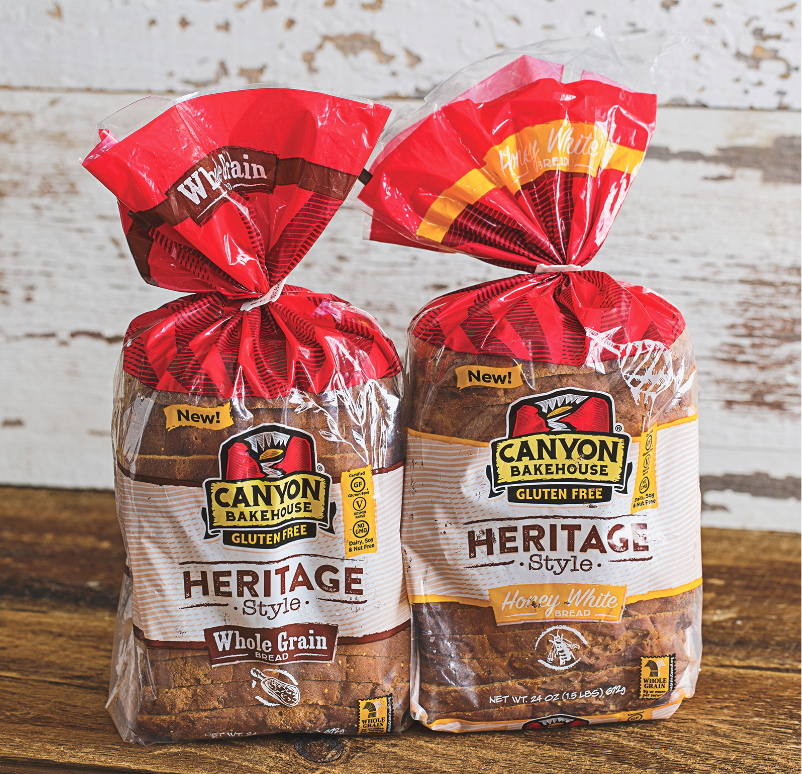 Varieties offered under the Stay-Fresh line include Ancient Grain bread, Hawaiian Sweet bread and Deli White bagels in the fresh bread aisle. The company also sells 7-Grain bread, Cinnamon Raisin bread, and Everything bagels in the freezer.
Varieties offered under the Stay-Fresh line include Ancient Grain bread, Hawaiian Sweet bread and Deli White bagels in the fresh bread aisle. The company also sells 7-Grain bread, Cinnamon Raisin bread, and Everything bagels in the freezer.
“Our goal is to sell our products wherever consumers are looking for gluten-free products, whether that’s in the freezer, fresh bread aisle, or online,” he said.
Mr. Letchinger said Canyon was the first baking company to introduce wide-pan, large-slice loaves of gluten-free bread, and these products steadily have gained distribution over the past year.
“Until recently, a common consumer comment on all gluten-free loaves was their small size,” he said. “Instead of making one sandwich, people were having to make two just to equal a ‘normal’ sandwich. Our Heritage Style loaves were the first wide-pan gluten-free loaves that allowed people to make real, hearty sandwiches, and we’re really proud of this major achievement.”
Without gluten, the “glue” that holds bread together, producing loaves with larger slices is a challenge, requiring formulation innovation and “understanding how ingredients and baking techniques work together to get the right size and shape” without compromising on the taste consumers expect, Mr. Letchinger said.
“Gluten-free baking is different from traditional baking, and not all traditional baking techniques apply to all aspects of the process,” he said. “Specialized equipment is often used to process and deposit the dough. The relatively new science of gluten-free makes it important to pair knowledgeable operations, engineering and R.&D. teams to create homegrown formulas and processes for manufacturing new products.”
The objective of Canyon Bakehouse is not to bake “bread-like” products but “real bread” without the grains that contain gluten, Mr. Letchinger said.
“We were founded by a family very familiar with the same struggles and frustrations other celiac families face when looking to find great-tasting, safe products,” he said. “That connection has helped us build a close relationship with our consumers and a better understanding of how our products can help fill a void from having to cut out — or set lower expectations for — breads and baked goods.”
Under the Cobblestone Bread Co. banner, Flowers launched Nathan’s Famous hot dog buns in the spring of 2018. John Steed, senior vice-president, fresh packaged bread business unit, said Flowers has its eye on merchandising opportunities for buns near the refrigerated meat section at retail. The company was set to launch Nathan’s Famous hamburger buns on March 18 as a complement to the frankfurter buns.
Flowers’ top brands have helped offset weakness in other parts of its baking business. The company said both Nature’s Own and Wonder have been gaining share while D.K.B. sales jumped 45% in 2018 from the year before, in dollar sales. Sales of its newly acquired Canyon Bakehouse brand rose 30% in 2018.
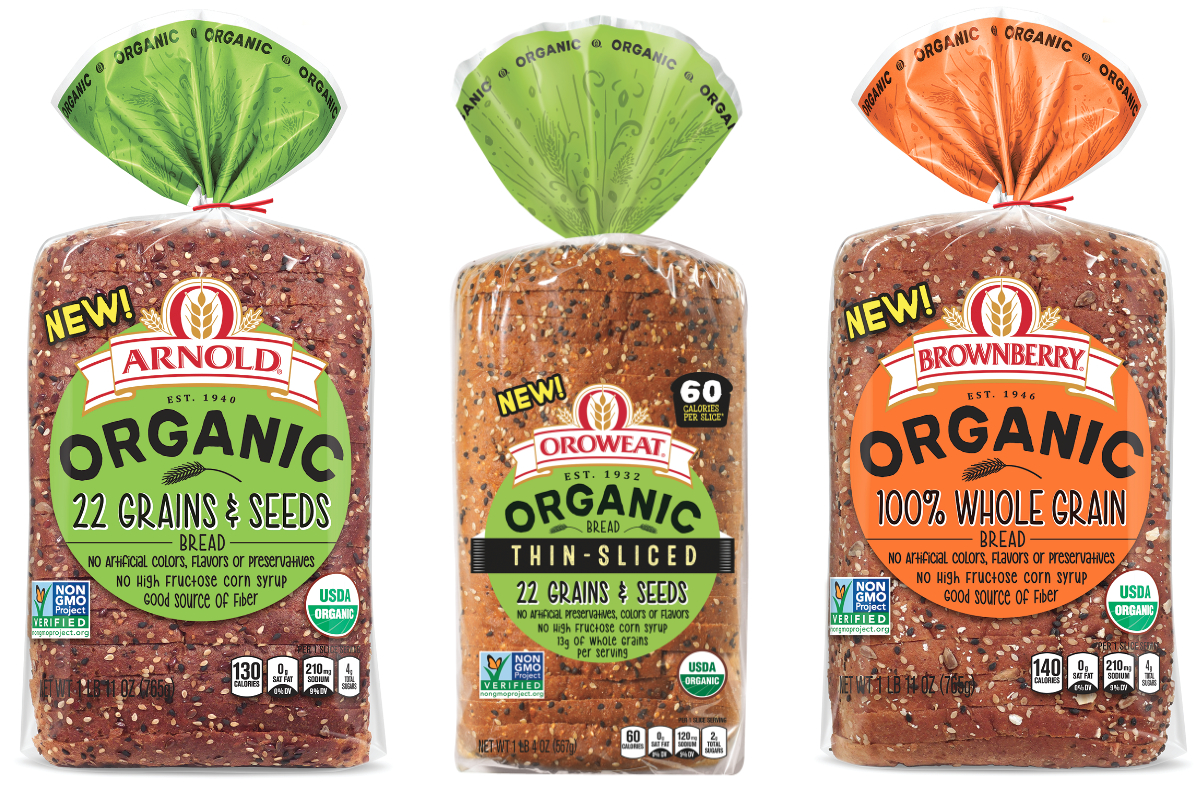
New organic tack at B.B.U.
The introduction of organic versions of some of the company’s best known premium bread brands was among steps Bimbo Bakeries USA took in 2018 to update its product line. In addition, the company has expanded distribution of its Thomas’ branded swirl bread and is test marketing in California The Rustik Oven, an artisan bread variety B.B.U.’s parent company Grupo Bimbo S.A.B. de C.V. has been selling in Spain.
The organic bread line was introduced in June under three brand names — Arnold, Brownberry and Oroweat — and in three varieties — 22 Grains & Seeds, Rustic White and 100% Whole Grain.
The 22 Grains & Seeds contains a blend of grains and seeds, including flaxseed, chia and other ancient grains. The Rustic White features sea salt and “thick, fluffy slices.” The line is U.S. Department of Agriculture-certified organic and Non-GMO Project verified and contains no artificial preservatives, colors, flavors, high-fructose corn syrup or trans fat. The bread is available in 27-oz packages.
Jon Silvon, vice-president of B.B.U., said the organic launch is being “supported by a 360-degree marketing campaign.”
“We continue to see promising results as trial and repeat grow,” he said. “These offerings are available nationwide.”
The introduction represents a shift for B.B.U., which for several years had focused its efforts in organic bread on the Eureka! brand. Launched in 2012 in California, Eureka! was added to East coast markets in 2014 and rolled out nationally in 2016. The line of six varieties grew in 2017 with the addition of Outta Sight White, but Bimbo has said little about the brand since.
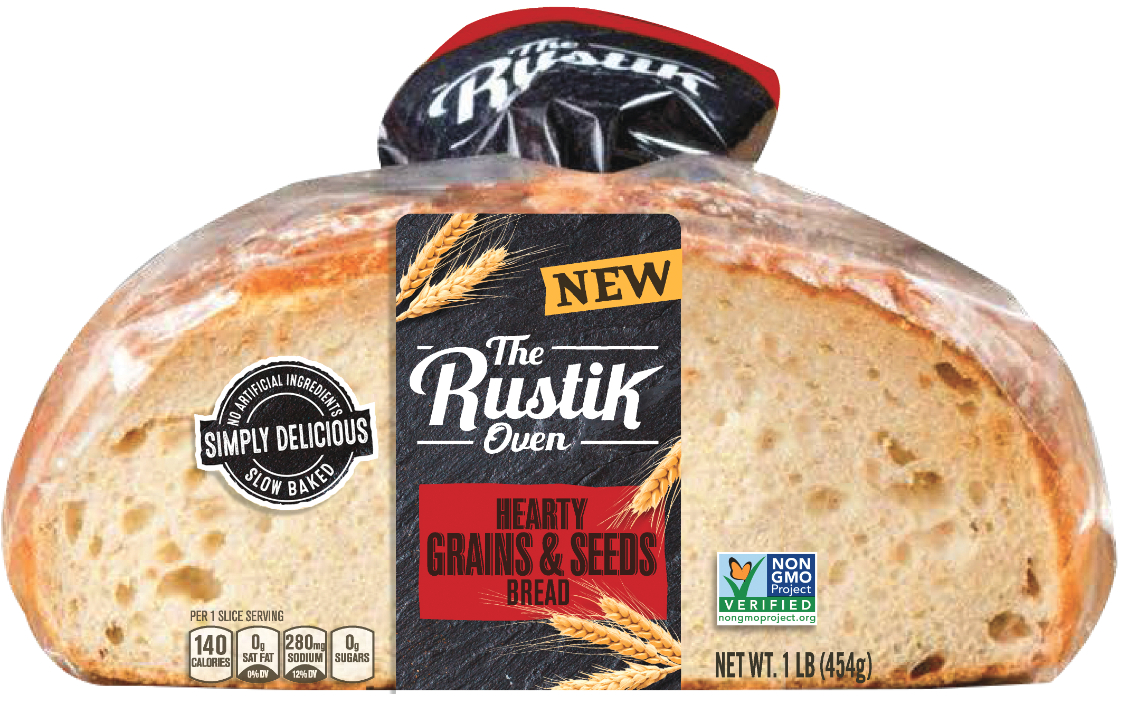 Mr. Silvon said The Rustik Oven was brought to the United States after a successful launch in Spain.
Mr. Silvon said The Rustik Oven was brought to the United States after a successful launch in Spain.
“Focused on consumer demand for artisanal, hand crafted breads, The Rustik Oven addresses consumer needs at the intersection of simple ingredients and real food,” he said.
Promoted with a tagline of “Where simple meets real,” B.B.U. describes The Rustik Oven as an artisanal bread that lasts. Packages feature a prominent call-out highlighting its clean label — “Slow baked with eight simple ingredients.” Rustik has been introduced in three varieties — Artisan White, sourdough and Hearty Grains and Seeds. Produced with a sourdough starter, The Rustik Oven bread is baked slowly in a stone oven, ensuring even baking and allowing the loaf to develop a firm, golden crust, B.B.U. said. The company said the sourdough variety ferments 24 hours before baking.
The Rustik Oven introduction marks the second time in recent years B.B.U. has looked to one of its overseas markets to mine a production innovation idea for transplantation to the United States. In 2015, the company launched Artesano bread in the United States under the Sara Lee banner. The product, which originated in Bimbo’s business in Colombia, has enjoyed great success.
“Artesano continues to win awards for the best innovations in the consumer products category,” Mr. Silvon said. “In 2018 we expanded its momentum with the addition of Artesano buns.”
Commenting on the expanded distribution of the Thomas’ swirl bread, Mr. Silvon said the move followed successful launches in the Northeast and Southeast. He said B.B.U. swirl has helped expand the overall breakfast bread category.
Mr. Silvon was upbeat on Bimbo’s positioning in the bread category.
“Bimbo Bakeries USA portfolio continues to show promise across all segments,” he said. “While the category remains relatively flat, 2018 saw promising growth on our core mainstream and premium bread brands — Sara Lee, Arnold, Brownberry and Oroweat.”
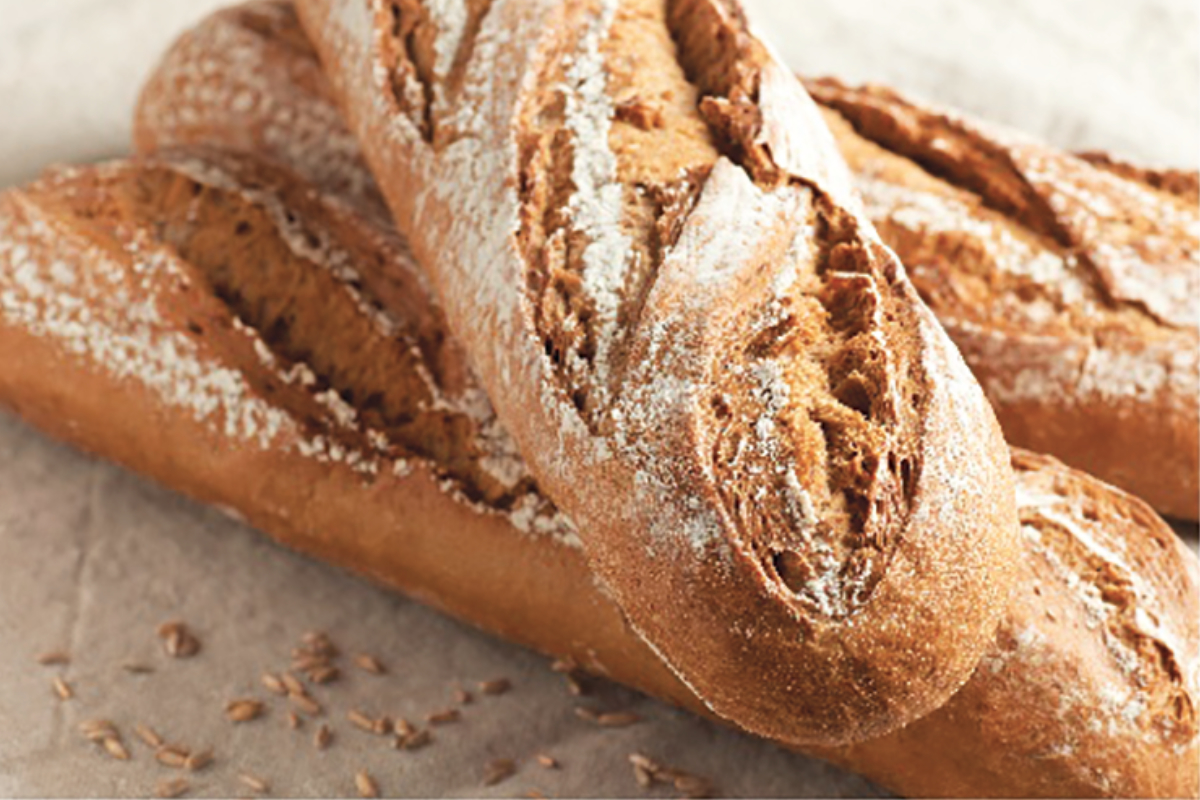
Europastry builds Wenner line
A bun with a honeycombed crumb and crystalline crust, a line of brioche rolls and several ciabatta varieties are products introduced recently by Europastry USA, with U.S. operations headquartered in Ronkonkoma, N.Y.
In 2015, Barcelona, Spain-based Europastry acquired a stake in Wenner Bakery, Ronkonkoma, a family-owned business with 60 years’ experience in the frozen bakery market. Europastry took full ownership of Wenner in 2018 and rebranded the business as Europastry USA while maintaining the Wenner Bakery name for its line of bread products.
“Wenner Bakery has an excellent reputation in the bread market,” said Alberto Alvarez, director of marketing. “So it will be our U.S. bread brand.”
Europastry has distribution in more than 50 countries globally with a presence in Europe, Asia, Oceania, Africa and South America. Roughly 45% of the company’s sales fall in the bread category, Mr. Alvarez said, with the balance of sales in pastries, donuts and cakes. The United States accounts for about 20% of the company’s $800 million in global sales.
Wenner’s line of bread products include ciabatta and hand-tied knot dinner rolls, traditionally baked by pizzerias with leftover pizza dough. In addition to a plant in Ronkonkoma on Long Island, Europastry USA has baking plants in nearby Bayport as well as New Brunswick, N.J. In the continental U.S., the company has nationwide distribution.
“Last year we began working on lots of different products — a clean label artisan loaf and baguettes with long fermentation and an artisan appearance,” Mr. Alvarez said.
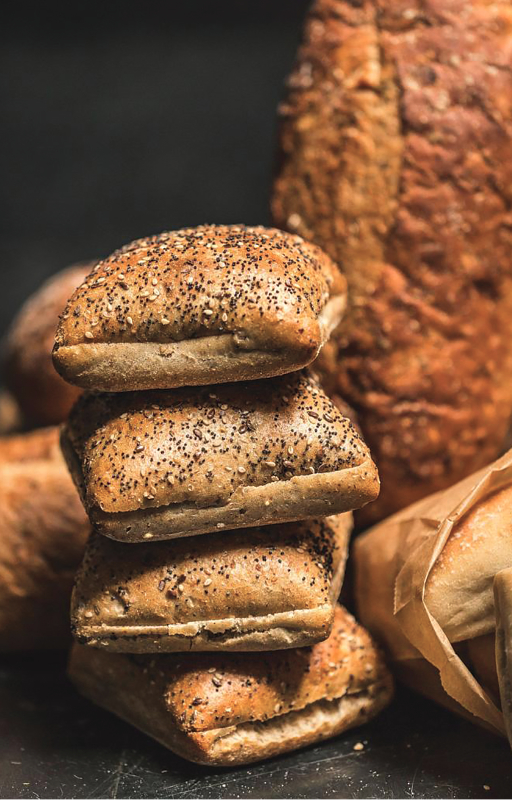 In supermarkets, the company’s products are sold in in-store and deli departments. A wide range of bread varieties are offered in the deli for sandwiches. The company’s products also are sold to food service customers.
In supermarkets, the company’s products are sold in in-store and deli departments. A wide range of bread varieties are offered in the deli for sandwiches. The company’s products also are sold to food service customers.
“A big growth opportunity for us is in the supermarket channel,” he said. “The deli area is getting bigger and bigger. We have a full range of baked and bagged items. One-touch product for the retailer. Open the case and displays into the shelves. We have artisan bread that the supermarket can slice and rolls already sliced. We do not make packaged bread for the commercial aisle. In ciabatta, we are one of the big players in the American market.
“Our process is special, including four hours fermentation. The ciabatta has really good texture with open cell structure and rustic appearance.”
New varieties of Europastry’s artisan ciabatta include olive oil, Kalamata olive and asiago cheese.
Over the past year, the products have been reformulated with clean label recipes, something Mr. Alvarez said customers are requiring.
“The end consumer wants to understand what they are eating, and we are aligned with that,” he said.
The ciabatta are fully baked, and the customer does not need to bake the loaves off.
“If you want to sell crispy, hot bread, the ciabatta may be refreshed in the oven,” he said.
Consumers also may refresh the loaf at home, to ensure a crispy crust.
“We recently combined our hand-tied knots with a major trend — the brioche,” Mr. Alvarez said. “We launched an exclusive vegan hand-braided brioche category. We’re introducing three products — a hand-braided brioche knot, a brioche hand-braided brioche bun and a hand-braided brioche style braid.”
The company is looking to meet the evolving needs both for retailers and consumers, Mr. Alvarez said.
“Retailers are looking for convenience at the store level — fully baked, already bagged and artisan style,” he said. “At the store level, they want a one-touch product. Open the case, put it on display and sell. Our new vegan brioche products meet these requirements and, additionally, has clean label with a 10-day shelf life.
“The consumer is looking for this soft, fluffy texture with a sweet touch as well. Brioche is growing in retail and food service. Many food service operators have brioche on their menus. We decided to move forward and be aligned with market trends.”
Still another new product introduced under the Wenner Bakery label by Europastry in recent months is the Crystal Burger Bun, which Mr. Alvarez said gains distinctive characteristics from a process of up to 80% hydration.
“It’s a very light interior with an open cell structure,” he said. “It’s a sourdough product with clean label and G.M.O.-free, already sliced.”
The company said the formulation and baking process give the bun a delicate quality with a honeycombed crumb and a soft texture.
“The fine, golden crystalline crust feels amazing in the mouth,” Europastry said.
Mr. Alvarez said the company expects retailers to sell the buns principally in the in-store bakery and deli for the production of premium sandwiches.
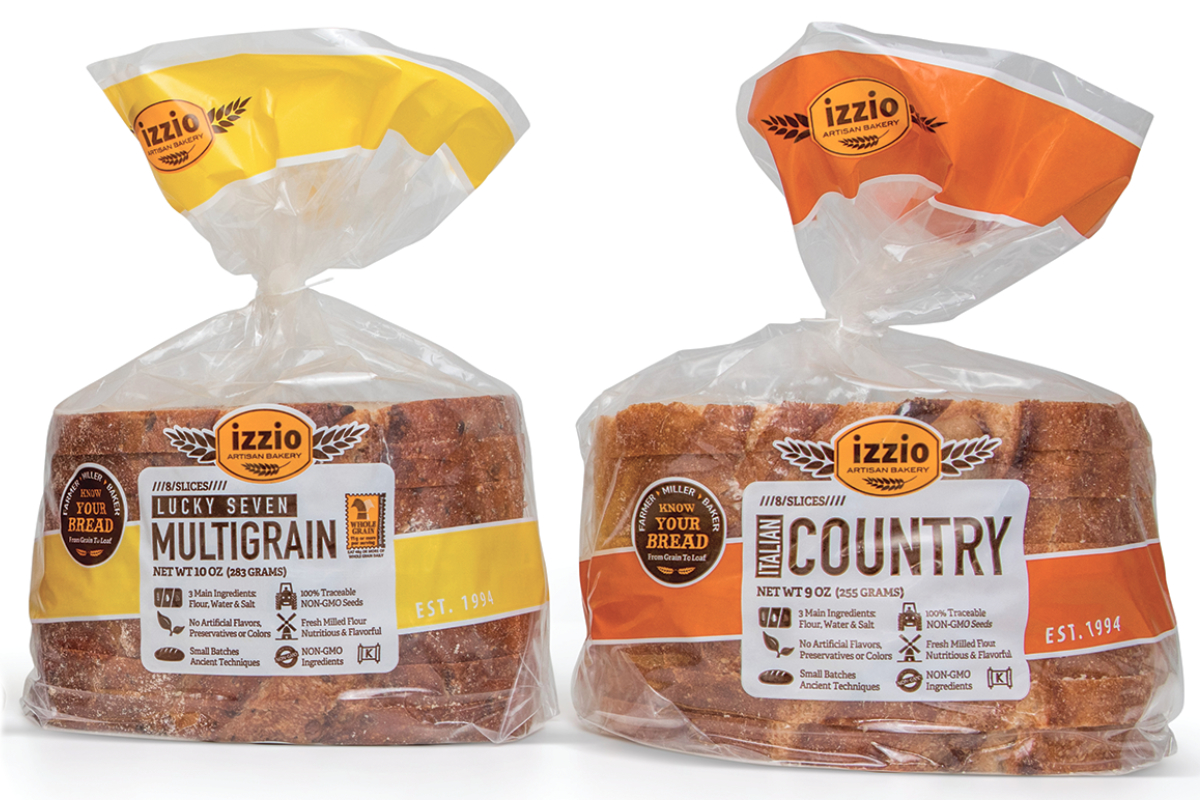
Izzio focus shifts to artisan
A company with a history of tapping into emerging trends is Izzio Artisan Bakery. Based in Louisville, Colo., northwest of Denver, Izzio was established in 1994 as a sandwich company and opened a bakery in 1998.
Originally named Udi’s, the company began baking gluten-free bread in 2008, said Etai Baron, owner and chief executive officer.
“The story of our business is that we had a fresh bakery, and out of that we started a new packaged goods company, which turned into Udi’s gluten-free and granola,” Mr. Baron said. “The national products company became very successful, huge.”
The gluten-free business was sold for $125 million in 2012 to Smart Balance, a business later renamed Boulder Brands. Boulder Brands was acquired in 2015 by Pinnacle Foods, and the latter company was acquired last year by Conagra Brands, Inc.
Smart Balance also acquired the rights to the Udi’s name.
“Udi was my father’s name,” Mr. Baron said. “Izzio is the name of our head baker and a partner in the company.”
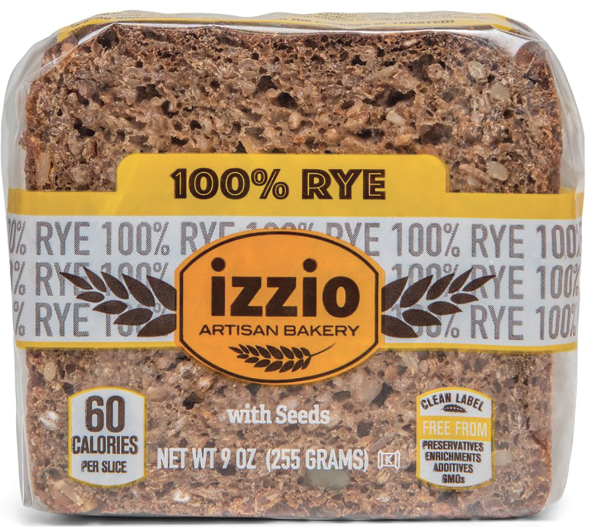 Even as the company grew in the gluten-free space, Udi’s/Izzio maintained a foothold in the traditional bread market, Mr. Baron said.
Even as the company grew in the gluten-free space, Udi’s/Izzio maintained a foothold in the traditional bread market, Mr. Baron said.
“Our niche was very unique long fermentation artisan bread that we sold only in the local market, in Denver,” he said. “When we were successful with gluten-free, we decided to begin selling our other baked foods outside the market. We were able to use what we learned doing business with the nation’s largest retailers, how to build a distribution system.
“We have been pursuing this expansion for the last four to five years. It’s going well. We have a national presence.”
Sara Kafadar, chief commercialization officer and a co-owner of the business, said Izzio about four years ago stepped up its efforts to change its product line to appeal to consumers more broadly.
“We embarked on a journey to work with our local miller in Colorado,” she said. “We wanted 100% traceability to our mill, to our specification and to our bakery nearly daily to capture the freshness of the flour. It’s becoming increasingly important to shoppers to know where their food is coming from.”
Ms. Kafadar said a focus on clean label requires a focus on flour for bakers. Izzio’s flour has been supplied by Ardent Mills L.L.C., Ms. Kafadar said.
“The largest ingredient in bread is flour,” she said. “It was very important for us to provide the cleanest possible flour to our customers. When we mill it, we remove the enrichments and additives added to enriched flour. Those are archaic at this point in time, from a period 80 years ago when people weren’t getting enough vitamins. That isn’t the case anymore.”
With the removal of enrichment, Izzio’s labels need to say little more than water, flour and salt, she said. The bread products also contain some barley, which is part of the sourdough starter. She said the effort has paid off.
“It’s how we became recognized in the marketplace — cleanest label, traceability from grain to loaf,” Ms. Kafadar said. “We bake in very small batches. Rely on natural and fermentation, that lasts three to four days. The process breaks down the gluten, making it easier for our bodies to digest it, instead of bloated and tired.”
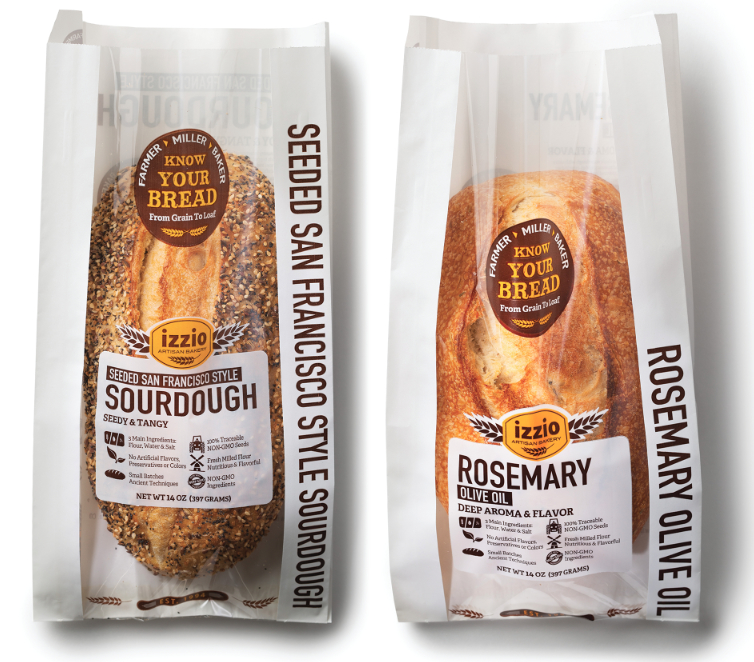 She credited the company’s master baker Maurizio Negrini for taking Izzio in new directions while adhering to “strict, authentic baking techniques.”
She credited the company’s master baker Maurizio Negrini for taking Izzio in new directions while adhering to “strict, authentic baking techniques.”
“Everything is small batch,” she said. “We produce small batches. Wide variety of starters, clean flour, baking at high temperatures, resulting in a golden brown crackling exterior with soft and chewy inside.”
Izzio’s product focus is on three categories — artisan sliced, take-and-bake, and 100% rye.
The loaf size sets apart Izzio’s artisan sliced bread in the category, Ms. Kafadar said.
“We take an authentic loaf and slice it into eight uniform slices for what we call the eight-slice category,” she said. “The main reason shoppers buy bread is to make sandwiches. They no longer want to buy conventional sliced bread. With the eight-slice, which we sell all over the country, there is a small package with no waste.”
Ms. Kafadar said the product has a five-day shelf life. A 22-slice version is available for large families, Ms. Kafadar said.
Take-and-bake is offered in four varieties — San Francisco sourdough, demi baguette, ciabatta and French baguette. Packaged in kraft paper with an open window, the product is “authentic, high-end artisan bread,” baked off by the consumer, Ms. Kafadar said.
Health and wellness are part of the focus behind the 100% rye with seed and ancient grain bread with spelt. Ms. Kafadar said the 100% rye is inspired by German-style rye bread — dense and densely packed.
“It is made with North American grain,” she said. “Every ingredient is soaked or fermented. It’s broken down to its cleanest state. The bread has longer shelf life because of density of bread — 10 to 15 days. They are also for the bread conscious eater. We have followers who have diabetes, who follow glycemic index diets, Weight Watchers and some keto. The rye contains a net 10 grams of carbohydrates per serving. The ancient grain has a similar profile, just a different flavor.”
Retailers selling Izzio products include Kroger nationwide and Whole Foods regionally. The bread is sold at New Seasons Market in the Pacific Northwest and California, Earth Fare in the Carolinas and at several independent supermarket chains in the Midwest.




